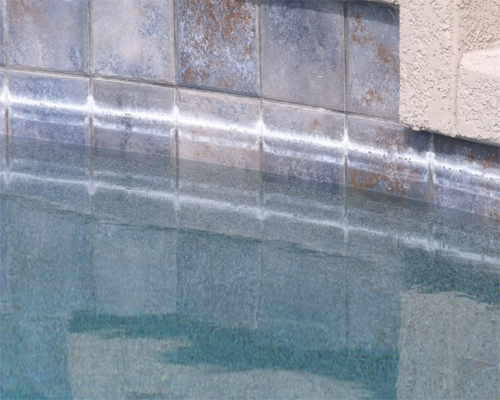Along with chemical additions, Pool Logger calculates your pool's calcite saturation index, or CSI. Why? The CSI in simple terms is a way to measure how suceptable your pool is to calcium scaling or in plaster surfaces, pitting. This number is important, especially in plaster pools. If you have too negative of a CSI (less that -0.6) your plaster or pebble surface can actually leach calcium and cause pitting, damaging the surface of the plaster and shortening it's life. On the other hand, if the CSI is too positive, you can cause calcium scaling. You know, that nice white ring around the edges of the pool.

CSI is calculated using pH, Total Alkalinity, Calcium Hardness, Cyanuric Acid, Salt, Borates, and Pool Temperature. The biggest factor in the CSI number is actually not calcium hardness like you would think, it is pH. So make sure you keep your pH in check. A lot of people that have salt water pools get pH rise if their Total Alkalinity levels are high. Most of those pools sit at 8.2 or higher for pH which causes quite a high CSI. This causes some of that scaling I was talking about. If you get your alkalinity in check (lower it) then the pH will stop rising and you won't have the scaling. (That is for another blog post) Also, if you run a fairly high CSI level and then heat your pool, or connected spa significantly, it can cause the CSI to rise quite a bit as temperature has an effect on the CSI as well.
Helpful tip: To add calcium in the pool you need to get Calcium Chloride Pellets. Pool Stores want to sell this stuff for around $50 for 25 pounds. However, you can get the same thing for a fraction of the price on Amazon or other places. The trick is to look for high purity Ice Melt products like this one here
. It is 94% pure calcium chloride and works exactly the same as the pool branded products. And of course you can use Pool Logger to tell you how much to add.
To really get an accurate CSI reading, you must use an accurate test kit like the Taylor K-2006 Test Kit or the TF-100 Test kit
for accurate results. The Taylor Magnetic Speedstir
is also really helpful in getting fast accurate results.. So, if you have a plaster pool, you want to make sure to keep your CSI above -0.6, preferably above -0.3. And for all pool surfaces, you want to keep your CSI below 0.6, preferably below 0.3.